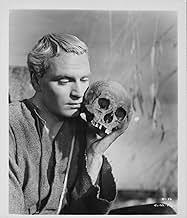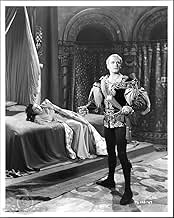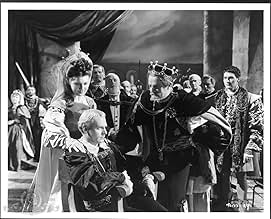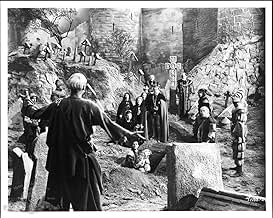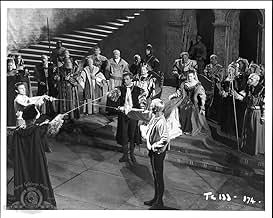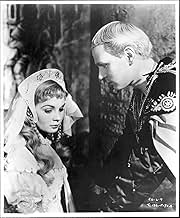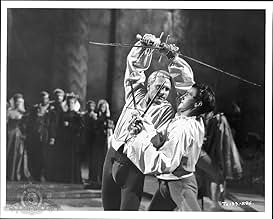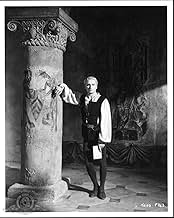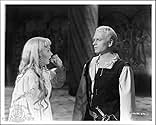Hamlet
- 1948
- Tous publics
- 2h 34m
Prince Hamlet struggles over whether or not he should kill his uncle, whom he suspects has murdered his father, the former king.Prince Hamlet struggles over whether or not he should kill his uncle, whom he suspects has murdered his father, the former king.Prince Hamlet struggles over whether or not he should kill his uncle, whom he suspects has murdered his father, the former king.
- Director
- Writers
- Stars
- Won 4 Oscars
- 18 wins & 6 nominations total
- Undetermined Secondary Role
- (uncredited)
- Director
- Writers
- All cast & crew
- Production, box office & more at IMDbPro
Featured reviews
Like the Zeffrilli/Gibson and Branaugh versions of Shakespeare's classic that followed, Olivier's adaptation is a mostly excellent film with several annoying flaws keeping it just out of reach of greatness.
Olivier is superb as Hamlet --- especially when delivering the soliloquies, several of which are genuinely powerful. The rest of the cast, however, is a mixed bag. Herlie is very good, managing to completely overcome that fact that she is really 13 years younger than Olivier. Sydney has his moments and does a decent job, but never really gets across who Claudius really is. Aymer is amusing but nothing more. Simmons makes a good Ophelia, albeit not a great one. Norman Wooland is excellent as Horatio (which is a tough role to actually be memorable in). Stanley Holloway is good as the Gravedigger, but somehow he doesn't nail the part the way Billy Crystal did in the 1996 version. Finally, Peter Cushing is odd as Osric. The rest of the cast is either stiff or completely uninteresting.
However, other than some weak performances, Olivier does a superb job directing everything. The atmosphere during the ghost scenes is absolutely suffocating and starts the film off well. And right from that scene, it's obvious that the camera work is going to be awesome. The camera moves and sweeps everywhere --- but not just for the sake of moving and sweeping like many movies (coughMichaelBaycoughcough). It creates extraordinary images and energy that make many scenes unforgettable --- without calling too much attention to itself.
William Walton's creepy music adds a lot.
Finally, the climactic fencing scenes are genuinely great easily the best fencing scenes in a version of Hamlet and possibly among the best in film history.
However, despite many great scenes, the movie never creates the emotions it needs to really make the blows come. Yes, some scenes are truly compelling, but on the whole, it misses the mark in that department.
However, the scenes that work are brilliant, and despite the lack of emotional power, it is an entertaining and superbly made film that's just as worthwhile as its 90's successors (although it is marginally inferior to them, which is odd --- the 40's version inferior to the 90's remakes!).
The cold, Gothic sets frame the story perfectly. Elsinore's dreary look does as much to emphasize the characters' futile existence as any of the actors do. I should note that I've never seen a stage production of "Hamlet", so I'm not the best person to offer a comparison to a live version. I understand that Olivier cut much of the story to condense the movie so that he could emphasize the psychological aspect. Even so, he turned out a masterpiece, becoming the first person to direct himself to an acting Oscar, and giving us the first Best Picture winner not from the US. As for whether it was the year's best movie, I'd rank it as equal to "Treasure of the Sierra Madre", with both offering devastating focuses on the human condition. Definitely see it.
I see a few very strong elements with some blots, and I suppose these have both become amplified with the passage of 50 years.
First, the blots:
-- Every actor but Olivier is of lesser caliber. I suspect that some of this is what he had to work with, and some apparent clumsiness results from the then standard rendering of the Bard's works as speechifying.
-- The women, especially Ophelia are dreadful, absolutely dreadful -- Ophelia's only present because she screwed the boss.
-- The score was so heavy, so dated and so hard to ignore it almost made me turn away, regardless of the balancing strengths.
-- Hamlet's text presents problems. The best choice in my opinion is to keep it all as Branagh has. But the standard wisdom is that audiences won't sit through 4 hours, no matter how engaging. Then, the question is what to cut. One often keeps the well-known speeches and cuts into the plot about ideas. So here we lose Fortinbras, Rosenkrantz and Guildenstern, together with some rather lovely related language and notions. Too bad because there is a development in the logic of metaphor in the later, longer version of the play, and this is totally lost here.
-- Olivier insists on including the notion of Oedipus and Gertrude, absolutely not supported by the text, and only inferred if you don't understand that Hamlet's initial distress is because his succession has been interrupted (not that his access to his Mother has been interrupted).
-- Worse, Olivier not only believes Hamlet is a 'man that couldn't make up his mind' but tells us so at the beginning! Does he not get it? Does he not understand the complexities of reason? This is not a play about doubt, but about reasoning.
Now the gems:
-- Even though Olivier gets the character wrong, and has cut some good lines, he has a natural talent for living well in the language. Even though he's coming from the wrong place, and overly postures, his rendering of the lines comes from a rare genius. Worth experiencing, despite the surrounding distractions.
-- The costumes are too lush for my tastes, but they fit the set. And my, what a set it is. Except for the cheesy painted sky, this castle is pretty wonderful: lots of colonnaded corridors, mezzanines, stairs, aligned archways. Olivier may be trying to top archrival Orson Wells, but I think he has done very well in using the building to frame the action in a way that is fully cinematic, transcending the stage. The only effect that jarred was the thrice-done long pullback when Claudius conspires with Laertes.
--The film is in Black and White. Olivier had no choice of course, but it is a happy accident. Allows the photography to be more artistic, better lit, more abstract, just as the mood of the play would have it.
Bottom line: This is worth seeing to discuss, but the Branagh version is more true and has many fewer distracting blots.
Oscars Best Picture Winners, Ranked
Oscars Best Picture Winners, Ranked
Did you know
- TriviaWhen the movie was released, Sir Laurence Olivier said it had been filmed in black and white for artistic reasons. The true reason, as he later admitted, was that "I was in the middle of a furious row with Technicolor".
- GoofsA clock is heard chiming the half-hour in Westminster chimes. If chiming clocks were invented at the time of the action they wouldn't sound the Westminster chimes which date only - as the name suggests - from the installation of the Big Ben clock in 1859.
- Quotes
Hamlet, Prince of Denmark: To be, or not to be: that is the question: Whether 'tis nobler in the mind to suffer the slings and arrows of outrageous fortune, Or to take arms against a sea of troubles, And by opposing end them? To die: to sleep; No more; and by a sleep to say we end The heart-ache and the thousand natural shocks That flesh is heir to, 'tis a consummation Devoutly to be wish'd. To die, to sleep; To sleep: perchance to dream: ay, there's the rub; For in that sleep of death what dreams may come When we have shuffled off this mortal coil, Must give us pause: there's the respect That makes calamity of so long life; For who would bear the whips and scorns of time, The oppressor's wrong, the proud man's contumely, The pangs of despised love, the law's delay, The insolence of office and the spurns That patient merit of the unworthy takes, When he himself might his quietus make With a bare bodkin? Who would fardels bear, To grunt and sweat under a weary life, But that the dread of something after death, The undiscover'd country from whose bourn No traveller returns, puzzles the will And makes us rather bear those ills we have Than fly to others that we know not of? Thus conscience does make cowards of us all; And thus the native hue of resolution Is sicklied o'er with the pale cast of thought, And enterprises of great pith and moment With this regard their currents turn awry, And lose the name of action.
- Crazy creditsOpening credits prologue:
So oft it chances in particular men That through some vicious mole of nature in them, By the o'ergrowth of some complexion Oft breaking down the pales and forts of reason, Or by some habit grown too much; that these men - Carrying, I say, the stamp of one defect, Their virtues else - be they as pure as grace, Shall in the general censure take corruption From that particular fault.
- ConnectionsEdited into Histoire(s) du cinéma: Une vague nouvelle (1999)
Details
- Release date
- Country of origin
- Language
- Also known as
- Гамлет
- Filming locations
- D&P Studios, Denham, Uxbridge, Buckinghamshire, England, UK(studio: made at D&P Studios)
- Production company
- See more company credits at IMDbPro
Box office
- Budget
- £500,000 (estimated)
- Runtime
- 2h 34m(154 min)
- Color
- Aspect ratio
- 1.37 : 1


